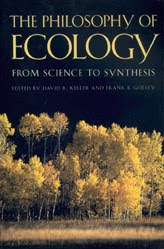Theaetetus
∞
Socrates and the Trees
It's always dangerous to assume one knows what Plato thinks, since Plato goes out of his way not to tell us what he thinks. Nevertheless, inasmuch as Socrates is his mouthpiece, here is one place where I think Socrates is mistaken. Socrates, speaking to Phaedrus, says, "I'm a lover of learning, and trees and open country won't teach me anything, whereas men in the town do." (230d)
I disagree with what Socrates says here, and it is an unfortunate fact of history that many Platonists have taken a similar position to this one. I just read this line in an otherwise very good book, David Keller and Frank Golley's The Philosophy of Ecology: From Science To Synthesis.
It's a fine collection of key articles in environmental philosophy. In the introduction, however, they contrast Socrates with Thoreau - something Thoreau himself did - and make Thoreau out to be the one more interested in trees. Thoreau was interested in trees, especially at the end of his life, but that does not make the comparison apt.
The irony of this line is that it comes from a dialogue in which Socrates continues to point out to his interlocutor just how much one can learn from a close observation of nature. He repeatedly draws attention to the trees, the water, and the cicadas. Socrates and Plato are not known as fathers of empiricism, but the view that their heads are so far in the Clouds that they cannot see the well they're about to step into has occupied too much of our attention. We would do better to notice that Socrates pays attention to the trees. We would do better still to pay some attention to the trees ourselves.
I disagree with what Socrates says here, and it is an unfortunate fact of history that many Platonists have taken a similar position to this one. I just read this line in an otherwise very good book, David Keller and Frank Golley's The Philosophy of Ecology: From Science To Synthesis.
It's a fine collection of key articles in environmental philosophy. In the introduction, however, they contrast Socrates with Thoreau - something Thoreau himself did - and make Thoreau out to be the one more interested in trees. Thoreau was interested in trees, especially at the end of his life, but that does not make the comparison apt.
The irony of this line is that it comes from a dialogue in which Socrates continues to point out to his interlocutor just how much one can learn from a close observation of nature. He repeatedly draws attention to the trees, the water, and the cicadas. Socrates and Plato are not known as fathers of empiricism, but the view that their heads are so far in the Clouds that they cannot see the well they're about to step into has occupied too much of our attention. We would do better to notice that Socrates pays attention to the trees. We would do better still to pay some attention to the trees ourselves.
